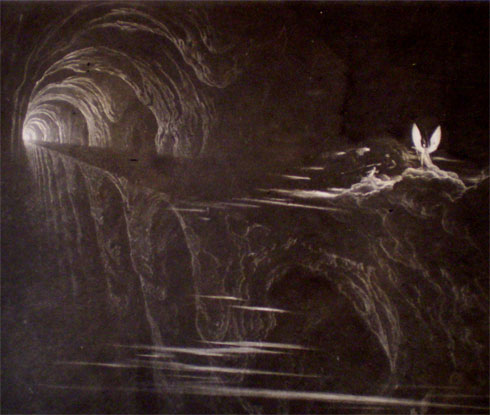 |
THE CHARACTERS OF PARADISE LOST
Chaos and NightChaos rules a realm of confusion on the edges of Hell, with his silent consort, Night, and a troop of unsound courtiers including Chance, Rumour, Tumult and Discord. In Book II, Satan struggles through this realm of hollow dark and the shock of fighting elements. He is directed to Eden by Chaos who also describes, from his perspective, the fall of the rebel angels and the encroachment of the human world on his territory. In Book X, this wild abyss is bridged by Sin and Death, providing easy access between Hell and Earth.
These characters, like Sin and Death, are allegorical, but their portrayal is (perhaps fittingly) confused by the addition of other elements, such as the slippage between the depiction of Chaos as a place and also as a character, i.e. the ruler of that place. As characters, they are appropriately intangible; Chaos is described 'with faltering speech and visage incomposed' (II.989) and Discord 'with a thousand various mouths' (II.967) (my emphasis). Chaos is also named 'the anarch old' (II.988) - the Greek word anarkhos, which gives us 'anarchy' as well as Milton's neologism 'anarch', means 'without a chief or ruler' but also 'without beginning'. This latter meaning conflicts with the temporality of 'old' adding confusion to the status of his existence. Similarly Night is called 'unoriginal' (X.477), which can be read as both 'derived' and 'without origin', the second reading gaining force when we remember he is also 'uncreated' (II.150). There has been much debate as to the morality of these characters. Chaos sends Satan on his way with the words 'go and speed; | Havoc and spoil and ruin are my gain' (II.1009), but as a place, Chaos is the 'womb of nature' (II.911), and holds the 'dark materials' (II.916) out of which God creates the universe. The answer is perhaps in the moral neutrality of something that exists outside of the framework of Creation. Although these are fairly minor characters, they have an important, yet subtle, presence which is felt throughout the poem. Viewed from heaven, earth is 'under the frown of Night' (III.424), with the 'ever-threatening storms | Of Chaos blustering round' (III.425). In their uncreated state, Chaos and his court represent both the potency of creation, and the threat of disorder or even dissolution that lies at the border of the created world.
PROCEED TO PARADISE...
|
| Copyright © 2008 Christ's College |
 |
